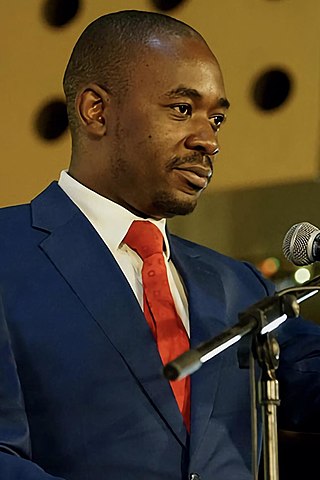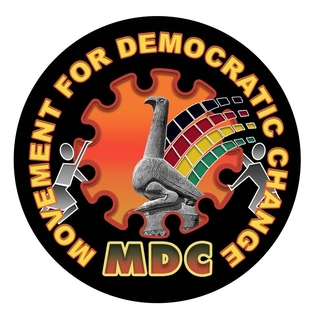Related Research Articles
The shadow cabinet or shadow ministry is a feature of the Westminster system of government. It consists of a senior group of opposition spokespeople who, under the leadership of the Leader of the Opposition, form an alternative cabinet to that of the government, and whose members shadow or mirror the positions of each individual member of the Cabinet. Their areas of responsibility, in parallel with the ruling party's ministries, may be referred to as a shadow portfolio. Members of a shadow cabinet have no executive power. It is the shadow cabinet's responsibility to scrutinise the policies and actions of the government, as well as to offer alternative policies. The shadow cabinet makes up the majority of the Official Opposition frontbench, as part of frontbenchers to the parliament. Smaller opposition parties in Britain and Ireland have Frontbench Teams.

Kim John Carr is an Australian former politician who served as a Senator for Victoria between 1993 and 2022. Representing the Labor Party, he was a minister in the Rudd and Gillard governments.

The Official Opposition in New Zealand is usually the largest political party or coalition which is not a member of the ruling government—it does not provide ministers. This is usually the second-largest party in the House of Representatives, although in certain unusual circumstances it may be the largest party or even a third or fourth party.

Michael John Clyde Ronaldson is a former Australian politician. He was a Senator for the state of Victoria representing the Liberal Party from July 2005 until February 2016, and previously served in the House of Representatives for Ballarat from 1990 to 2001. Ronaldson served as the Minister for Veterans' Affairs, the Minister Assisting the Prime Minister for the Centenary of ANZAC, and the Special Minister of State in the Abbott government from 2013 to 2015.

Professor Arthur G.O. Mutambara is a multifaceted leader, academic, and technology expert currently serving as the Director and Full Professor of the Institute for the Future of Knowledge (IFK) at the University of Johannesburg (UJ) in South Africa. Renowned for his expertise in robotics, academia, Pan-Africanism, and technology strategy, he is a pivotal figure in shaping the future of knowledge and technological advancement. At IFK, Professor Mutambara leads the Decentralized Artificial Intelligence and Control Systems (DAICS) Research Group, driving groundbreaking research initiatives. He also spearheads the African Agency in Public Health (AAPH) initiative within the Future of Health (FoH) Research Group, demonstrating his commitment to leveraging technology for societal well-being. In addition to his academic responsibilities, Professor Mutambara is deeply involved in teaching Control Systems at both UJ's Mechanical Engineering and Electrical and Electronic Engineering Departments, imparting knowledge and fostering innovation among students.

Tendai Laxton Biti is a Zimbabwean politician who served as Finance Minister of Zimbabwe from 2009 to 2013. He is the second Vice President of Citizens Coalition for Change. He was the Secretary-General of the Movement for Democratic Change and the subsequent Movement for Democratic Change – Tsvangirai (MDC-T) political parties and a Member of Parliament for Harare East until he was expelled from the party and recalled from parliament in mid-2014,before winning the seat again in 2018.

Nelson Chamisa is a Zimbabwean politician and the former President of the Citizens Coalition For Change. He served as Member of the House of Assembly of Zimbabwe for Kuwadzana East, Harare. Chamisa was the MDC Alliance's candidate for president in the 2018 general election, having previously been the leader of the party's youth assembly. He has served as the former chairperson of national youth for the same party as well as the Secretary for Information and Publicity for the opposition party Movement for Democratic Change (MDC). In 2003, at the age of 25, Chamisa became the youngest Member of Parliament. Chamisa was also the youngest cabinet minister in Government of National Unity of Zimbabwe in 2009.

The prime minister of Zimbabwe was a political office in the government of Zimbabwe that existed on two occasions. The first person to hold the position was Robert Mugabe from 1980 to 1987 following independence from the United Kingdom. He took office when Southern Rhodesia became the Republic of Zimbabwe on 18 April 1980. This position was abolished when the constitution was amended in 1987 and Mugabe became president of Zimbabwe, replacing Canaan Banana as the head of state while also remaining the head of government. The office of prime minister was restored in 2009 and held by Morgan Tsvangirai until the position was again abolished by the 2013 Constitution of Zimbabwe.

Thokozani Khupe is a Zimbabwean politician, trade unionist and CCC party member. She was Deputy Prime Minister 2009–13.

David Coltart is a Zimbabwean lawyer, Christian leader and politician. He was a founding member of the Movement for Democratic Change when it was established in 1999 and its founding secretary for legal affairs. He was the Member of Parliament for Bulawayo South in the House of Assembly from 2000 to 2008, and he was elected to the Senate in 2008. He was the Minister for Education, Sport, Arts and Culture from February 2009 until August 2013. He is a top official of the Citizens Coalition for Change political party which was formed in 2022.

The 2008–2009 Zimbabwean political negotiations between the opposition Movement for Democratic Change, its small splinter group, the Movement for Democratic Change – Mutambara, and the ruling Zimbabwe African National Union – Patriotic Front were intended to negotiate an end to the partisan violence and human rights violations in Zimbabwe and create a framework for a power-sharing executive government between the two parties. These negotiations followed the 2008 presidential election, in which Mugabe was controversially re-elected, as well as the 2008 parliamentary election, in which the MDC won a majority in the House of Assembly.

The Movement for Democratic Change (MDC) was a Zimbabwean political party organised under the leadership of Morgan Tsvangirai. The MDC was formed in 1999 as an opposition party to President Robert Mugabe's Zimbabwe African National Union – Patriotic Front (Zanu-PF). The MDC was made up of many civic groups who campaigned for the "No" vote in the 2000 constitutional referendum, which would limit a president's service to two terms, before the introduction of a prime minister, as well as giving legal immunities to the state.

The Movement for Democratic Change – Tsvangirai (MDC–T) is a centre-left political party and was the main opposition party in the House of Assembly of Zimbabwe ahead of the 2018 elections. After the split of the original Movement for Democratic Change in 2005, the MDC–T remained the major opposition faction, while a smaller faction, the Movement for Democratic Change – Ncube, or MDC–N, was led by Welshman Ncube.

Morgan Richard Tsvangirai was a Zimbabwean politician who was Prime Minister of Zimbabwe from 2009 to 2013. He was president of the Movement for Democratic Change, and later the Movement for Democratic Change – Tsvangirai (MDC–T), and a key figure in the opposition to former president Robert Mugabe.

Ed Miliband became Leader of the Labour Party and Leader of the Opposition upon being elected to the former post on 25 September 2010. The election was triggered by Gordon Brown's resignation following the party's fall from power at the 2010 general election, which yielded a Conservative–Liberal Democrat Coalition. Miliband appointed his first Shadow Cabinet in October 2010, following the Labour Party Shadow Cabinet elections. These elections were the last such elections before they were abolished in 2011.

General elections were held in Zimbabwe on 31 July 2013. Incumbent President Robert Mugabe was re-elected, whilst his ZANU–PF party won a two-thirds majority in the National Assembly.

The Leader of the Opposition in the Senate is a party office held by the Opposition's most senior member of the Shadow Cabinet in the Australian Senate, elected to lead the opposition party in the body. Though the leader in the Senate does not have the power of the office of Leader of the Opposition, there are some parallels between the latter's status in the lower house and the former's in the Senate. In addition to his or her own shadow ministerial portfolio, the leader has overarching responsibility for all policy areas and acts as the opposition's principal spokesperson in the upper house. The leader is entitled to sit at the table of the Senate, and has priority in gaining recognition from the President of the Senate to speak in debate. Another similarity is that the leader typically announces changes to opposition officeholders in the Senate, including shadow ministers, party leadership and whips. The leader also has some responsibility for appointing opposition senators to committees, a role filled by the Manager of Opposition Business and whips in the lower house. The current leader is Simon Birmingham. He is assisted by a Deputy Leader of the Opposition in the Senate, currently Michaelia Cash.
The Shadow Ministry of Bill Shorten was the opposition Australian Labor Party shadow ministry from October 2013 to May 2019, opposing the Abbott government, Turnbull government and Morrison government.
Zimbabwe First Party (ZimFirst) is a political party in Zimbabwe which was founded on 10 April 2015. The party was founded by its current President Maxwell Zeb Shumba, who once served as the Chief Political Strategist for the other opposition political party's leader Morgan Tsvangirai. According to the official statement posted on the party's website, ZimFirst 's main objective is to form the next government through the electoral process, National elections in Zimbabwe are slated for 2018 and the party states that it will contest the presidential and parliamentary election. According to the party's manifesto primary focus of its government would be to re build the economy from an alleged US$4 billion to a "near US$1,5 trillion robust economy". At the time, Morgan Tsvangirai's spokesperson said he was unmoved by Shumba’s departure to form a new party. The Party slogan is Nyika Vanhu, Vanhu Ndiyo Nyika (Shona language version), Abantu Ilizwe, Yilizwe Ngabantu (Ndebele language version). Its ideology is enshrined in the three key principles of Honesty, Accountability, and Unity.

The shadow ministry of Peter Dutton is the current shadow cabinet of Australia since 5 June 2022, serving in opposition to the Albanese government. The shadow ministry is the Opposition's alternative to the Albanese ministry, which was sworn in on 1 June 2022.
References
- ↑ "Tsvangirai's shadow cabinet: Full list". Zimbabwe Election. 18 September 2013.